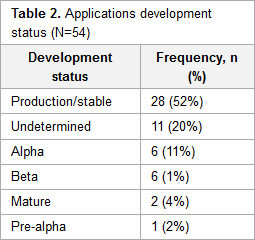Difference between revisions of "Template:Article of the week"
Shawndouglas (talk | contribs) (Updated article of the week text.) |
Shawndouglas (talk | contribs) (Updated article of the week text.) |
||
| Line 1: | Line 1: | ||
<div style="float: left; margin: 0.5em 0.9em 0.4em 0em;">[[File: | <div style="float: left; margin: 0.5em 0.9em 0.4em 0em;">[[File:Tab2 Alsaffar JMIRMedicalInfo2017 5-1.png|240px]]</div> | ||
'''"[[Journal: | '''"[[Journal:The state of open-source electronic health record projects: A software anthropology study|The state of open-source electronic health record projects: A software anthropology study]]"''' | ||
[[Electronic health record]]s (EHR) are a key tool in managing and storing patients’ [[information]]. Currently, there are over 50 open-source EHR systems available. Functionality and usability are important factors for determining the success of any system. These factors are often a direct reflection of the domain knowledge and developers’ motivations. However, few published studies have focused on the characteristics of [[free and open-source software]] (F/OSS) EHR systems, and none to date have discussed the motivation, knowledge background, and demographic characteristics of the developers involved in open-source EHR projects. | |||
This study analyzed the characteristics of prevailing F/OSS EHR systems and aimed to provide an understanding of the motivation, knowledge background, and characteristics of the developers. ('''[[The state of open-source electronic health record projects: A software anthropology study|Full article...]]''')<br /> | |||
<br /> | <br /> | ||
''Recently featured'': | ''Recently featured'': | ||
: ▪ [[Journal:PCM-SABRE: A platform for benchmarking and comparing outcome prediction methods in precision cancer medicine|PCM-SABRE: A platform for benchmarking and comparing outcome prediction methods in precision cancer medicine]] | |||
: ▪ [[Journal:Ten simple rules for cultivating open science and collaborative R&D|Ten simple rules for cultivating open science and collaborative R&D]] | : ▪ [[Journal:Ten simple rules for cultivating open science and collaborative R&D|Ten simple rules for cultivating open science and collaborative R&D]] | ||
: ▪ [[Journal:Ten simple rules to enable multi-site collaborations through data sharing|Ten simple rules to enable multi-site collaborations through data sharing]] | : ▪ [[Journal:Ten simple rules to enable multi-site collaborations through data sharing|Ten simple rules to enable multi-site collaborations through data sharing]] | ||
Revision as of 17:14, 30 May 2017
"The state of open-source electronic health record projects: A software anthropology study" Electronic health records (EHR) are a key tool in managing and storing patients’ information. Currently, there are over 50 open-source EHR systems available. Functionality and usability are important factors for determining the success of any system. These factors are often a direct reflection of the domain knowledge and developers’ motivations. However, few published studies have focused on the characteristics of free and open-source software (F/OSS) EHR systems, and none to date have discussed the motivation, knowledge background, and demographic characteristics of the developers involved in open-source EHR projects.
This study analyzed the characteristics of prevailing F/OSS EHR systems and aimed to provide an understanding of the motivation, knowledge background, and characteristics of the developers. (Full article...)
Recently featured:










